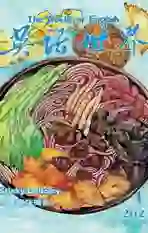Neighbour Rosicky (Excerpt VIII)《邻居罗西基》(节选八)
2024-04-22薇拉·凯瑟/文曹明伦/译析
薇拉·凯瑟/文 曹明伦/译析
Mary sat watching him intently, trying to find any change in his face. It is hard to see anyone who has become like your own body to you. Yes, his hair had got thin, and his high forehead had deep lines running from left to right. But his neck, always clean-shaved except in the busiest seasons, was not loose or baggy. It was burned a dark reddish brown, and there were deep creases in it, but it looked firm and full of blood. His cheeks had a good col- our. On either side of his mouth there was a half-moon down the length of his cheek, not wrinkles, but two lines that had come there from his habitual expression. He was shorter and broader than when she married him; his back had grown broad and curved, a good deal like the shell on an old turtle, and his arms and legs were short.
瑪丽坐在那儿盯着他打量,想从他脸上看出点儿变化。可对一个几乎已和自己融为一体的人,要察觉出什么变化实在太难。不错,他头发已经稀疏,额顶上已有深深的皱纹,可是,他那除农忙时节外总刮得干干净净的颈部并没有松垂,那截晒得黑里透红、布满深褶的脖子依然挺拔,血气旺盛。他面色依然红润,嘴角边各有一条半月形的曲线划过两边脸颊,但那不是皱纹,而是他习惯性表情形成的鼻唇沟。比起刚同她结婚那会儿,他变得矮了些,胖了些;背也宽了一点儿,弯了一点儿,像老乌龟的壳,因为他胳膊腿都很短。
He was fifteen years older than Mary, but she had hardly ever thought about it before. He was her man, and the kind of man she liked. She was rough, and he was gentle, —city-bred, as she always said. They had been shipmates on a rough voyage and had stood by each other in trying times. Life had gone well with them because, at bottom, they had the same ideas about life. They agreed, without discussion, as to what was most important and what was secondary. They didnt often exchange opinions, even in Czech—it was as if they had thought the same thought together. A good deal had to be sacrificed and thrown overboard in a hard life like theirs, and they had never disagreed as to the things that could go. It had been a hard life, and a soft life, too. There wasnt anything brutal in the short, broad-backed man with the three-cornered eyes and the forehead that went on to the top of his skull. He was a city man, a gentle man, and though he had married a rough farm girl, he had never touched her without gentleness.
罗西基比玛丽年长十五岁,可玛丽之前几乎没想过这点。他是她的男人,而且是她喜欢的那种男人。正如她经常所说,自己是个风风火火的乡下女人,而他却是个斯斯文文的城里男人。他俩一直是风浪中的同船水手,面对艰难总是同心协力。他们家的日子过得还算不错,因为从根本上讲,他俩对如何过日子有相同的看法。对什么最重要,什么较为次之,他俩无须商讨就能达成一致。他俩很少交换看法,哪怕是用捷克语,仿佛他们的心总能想到一处。过他们那种很现实的日子,总有许多东西要牺牲,许多东西要舍弃,可对该牺牲什么或舍弃什么,他俩从来没发生过分歧。这是种艰难的生活,也是一种温馨的生活。这个身材不高、肩膀宽阔、有双三角眼、秃头到顶的男人不曾有过粗暴的言行。他是个城里长大的男人,一个文雅的男人,虽然娶的是个粗犷的乡下姑娘,但对她从来都彬彬有礼。
They had been at one accord not to hurry through life, not to be always skimping and saving. They saw their neighbours buy more land and feed more stock than they did, without discontent. Once when the creamery agent came to the Rosickys to persuade them to sell him their cream, he told them how much money the Fasslers, their nearest neighbours, had made on their cream last year.
他俩都认为过日子不能敷衍马虎,不能一味精打细算。看见邻居们买更多的地,养更多的牛,他们也不眼馋。有次一个乳品贩子上门,劝他们卖奶油给他,并说他们的近邻法斯勒家去年就靠卖奶油赚了许多钱。
“Yes,” said Mary, “and look at them Fassler children! Pale, pinched little things, they look like skimmed milk. I had rather put some colour into my childrens faces than put money into the bank.”
“赚了钱没假。”玛丽对那位商贩说,“可你去看看法斯勒家那些孩子!一个个面黄肌瘦,看上去就像脱了脂的牛奶。我宁愿咱家孩子脸上有血色,也不愿银行里有存款。”
The agent shrugged and turned to Anton.
乳品贩子耸耸肩,把脸转向罗西基。
“I guess well do like she says,” said Rosicky.
罗西基说:“我想呀,咱们就照她说的办吧。”
【背景知识】《邻居罗西基》是美国女作家薇拉·凯瑟(1873—1947)于1930年发表的一篇重要短篇小说。小说通过回忆和追述的手法,讲述了波希米亚移民罗西基朴素而充实的一生,展现了拓荒者及其后代善良、朴素、勤劳、热爱生活、眷念土地的可贵品质。小说主题深刻,结构匀称,笔触细腻,文字优美,人物性格刻画清晰,翻译时应注意描摹。
【第1段】注意参考译文把第四句中的neck译作“颈部”,但把第五句中指代neck的代词it翻译成了“脖子”。这种处理方法叫作“单词分译”。“单词分译”由来已久,西塞罗在谈及他翻译狄摩西尼等人的演说词时就曾说:“当我没法用一个拉丁词翻译一个希腊词时,我就用几个拉丁词去翻译。”“单词分译”分为“必须的单词分译”和“非必须的单词分译”两类:前者是由于原文的某个词语在译文语言中没有完全对应的词语,只好用多个词语去表达,例如杨必把Vanity Fair(《名利场》)第十章第一段中的has ten thousand pounds and an establishment secure译成了“有一万镑财产,住宅家具奴仆一应俱全”(把establishment分译成了“住宅家具奴仆”);后者则是译者出于修辞目的或译文语言习惯的考虑,此处将neck分别译作“颈部”和“脖子”就属于这种情况。(另请参阅拙文《〈英汉互译实用教程〉“单词分译法”补遗》,《中国翻译》2018年第3期,第115—118页。)
【第2段】参考译文把原文形容玛丽的两个rough分别译成了“风风火火”和“粗犷”,把形容罗西基的两个gentle分别译成了“斯斯文文”和“文雅”,这种译法并非第一段评析所说的“单词分译”,而是译者根据实际语境选择的不同措辞(同义词),因前一个rough和gentle是玛丽在说她自己和她丈夫,而后一个rough和gentle则是作者在介绍男女主人公。另外,此段原文中的兩个hard也分别翻译成了“很现实的”(陆谷孙《英汉大词典》hard词条第10义项)和“艰难的”(陆谷孙《英汉大词典》hard词条第4义项),这同样是结合语境斟酌的结果。
【第3段】正因为讲究斟词酌句,参考译文才把not to hurry through life译成了“过日子不能敷衍马虎”,把not to be always skimping and saving译成了“不能一味精打细算”,以及把第二句中的discontent译成了“眼馋”。
【第4—6段】注意再现原文的口语语体,别把日常对话翻译得文绉绉的。一般人很容易把put money into the bank翻译成“把钱存进银行”,可“宁愿咱家孩子脸上有血色,也不愿银行里有存款”这样的句式显然使说话的语气更为连贯流畅。
【小结】本次译析介绍了“单词分译法”,强调了译者斟字组词的重要性。沉不下心来斟字组词是初学翻译者的通病,我在翻译专业学生的作业中经常发现,译者所用的字词几乎都是英汉双语词典释义用的措辞。我曾对学生说:“英汉词典不可能为每一个词条都提供充分的语言环境或充分的具体语境,在绝大多数情况下,词典编者只能解释每个词或词组的基本意义,至于该词或该词组的翻译,那应该是译者的任务。”(参阅《英汉翻译二十讲》,商务印书馆,2019,第187页。)所以,译者查词典主要是为了确定词义句义。我们常把翻译比喻成戴着镣铐跳舞,可许多青年译者只记住了“戴镣铐”就是不能脱离原文的本义(包括词义),却忘了“跳舞”要讲究舞姿,而要展现出“舞姿”,就要讲究斟词酌句。
